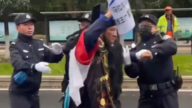【新唐人2015年01月17日訊】中國「民生觀察工作室」網站,在日前發佈《2014年度中國「被精神病」年終報告》。報告顯示,中國大陸正常的公民「被精神病」,已經成為當局慣用的打壓手段。隨著勞教制度的廢止,「被精神病」有進一步強化的跡象。
「民生觀察工作室」14號發佈的報告,材料來自對各地「被精神病」當事人的第一手採訪、調查,當事人自己的控訴材料,以及中共媒體的公開報導。
報告總結,中共《精神衛生法》實施一年多來,各地「被精神病」狀況依然嚴重。不僅如此,隨著勞教制度的廢止,為了加強對社會的管控,中共當局除了廣泛採取黑監獄、法教班等,非法剝奪公民人身自由權的方式外,也有加強通過「被精神病」來控制社會的跡象。
去年,除了不少曾經「被精神病」的上訪維權人士、異議人士,再次被關入了精神病院外,還出現了一些新的「被精神病」的案例,而且在去年3月人大、政協「兩會」前,和四中全會前,這種「被精神病」現象明顯增多。
報告分析,製造「被精神病」的主體是各地的維穩機構,包括公安、政府人員、街道辦、村鎮幹部,以及駐京辦成員。「被精神病」者不通過家屬與本人簽字同意,直接被綁架拘押,強制送入精神病院。
「被精神病」者被送醫院後,遭到捆綁、毆打、戴腳鐐手銬、強迫吃藥、打針、灌食、禁閉、不給放風、不給會見家人等等。他們要想出院,得經過維穩機構同意,同時還必須保證不再上訪,不對外揭露在精神病院受到的虐待等等。
遼寧訪民張海彥就因為舉報當地政府庇護下的黑社會,多次被當地警方送進黑監獄、精神病院關押迫害。
遼寧訪民張海彥:「他們造假、造假鑑定把我送精神病院去了,太恐怖了,精神病院太恐怖了,進去就天天吃藥,你不吃就給你綁床上,就是看守人員,都是男的,嚇唬你,太恐怖了,整個對你就是一種人身侮辱。」
按照前年5月正式實施的《精神衛生法》,精神病患者需同時滿足「重症」及「危害」兩個條件才能強制入院,否則就是違反了「患者住院自願原則」。但至今仍有一些正常公民被關押在精神病院。
報告披露,成都錦江區都玲一家3口因上訪,多次被關精神病院,最近這次已關押19個月了。遼寧瀋陽蘇家屯區小學老師李啟東,前年12月被第二次送入精神病院,直到現在家屬都沒見到人。
東南大學法學教授張讚寧指出,公安部門不是衛生行政主管部門,沒有資格或權力涉及精神病人治療領域。
東南大學法學教授張讚寧:「被精神病現象已經是很長期的,就是當局的一種故意行為,現在我尤其擔心的是,現在公安部門所辦的那些精神病院,仍然沒有取締或者撤銷,所以這就為『被精神病』仍然留下了一個隱患。」
中共公安自辦的安康醫院就是承擔強制醫療任務的精神病醫院。據「法輪大法明慧網」報導,目前中國各地仍有二、三十家安康醫院,一直兇殘地對法輪功學員實施精神和肉體虐殺。
「民生觀察」負責人劉飛躍:「中國仍然是一個『權比法大』這麼一個體制,特別是它目前講究維穩,穩定壓倒一切的情況下,即然『穩定壓倒一切』,它就也可以壓倒法制,這樣被精神病現象繼續發生就不奇怪了。」
「民生觀察」從2010年開始收集和登記「被精神病」者資料,至今已經收錄了數千名「被精神病」者,範圍涉及社會各個層面,包括中共黨委書記、法官、大學老師、農民工、普通職工等。
除少數因政治、家庭原因外,多數因維權被送入精神病院,只要和中共利益相牴觸,即使是中共官員也逃脫不了被「被精神病」的下場。
採訪編輯/李韻
Report: Forced Psychiatric Abuse Becomes Normal in China
The Civil Rights and Livelihood Watch (CRLW) recently
released its 2014 report on involuntary psychiatric treatment.
It shows that psychiatric abuse of healthy citizens has become
a conventional way for Chinese authorities to suppress people.
With the abolition of the labor education system,
psychiatric abuse has increased.
The report summarizes first-hand interviews and studies on
the Chinese Communist Party (CCP), its complaint materials,
and its public media reports.
It concludes that psychiatric abuse is very serious in China
even after its bringing in the Mental Health Act in late 2012.
With the abolition of the labor education system, the CCP is
tightening its control on society through its black jails,
“law education" classes, deprivation of personal liberties,
and now the mental health system.
Last year, some petitioners and dissidents who had suffered
forced psychiatric abuse were sent to mental hospitals again
for speaking out; new cases of abuse were also recorded.
Psychiatric abuse increased significantly leading up to
the National People’s Congress (NPC) and the Chinese
People’s Political Consultative Conference (CPPCC)
and its Fourth Plenary Session.
Analysis shows that cases of psychiatric abuse are linked
mainly with the agencies that “maintain stability", including
the police, government officials and offices, village cadres,
and the Beijing liaison office members, who directly kidnap
victims to mental hospitals, without getting an agreement
or signatures from either the individuals or their families.
The victim of psychiatric abuse is tied up, beaten, shackled
in handcuffs, force-fed medication and injected, and confined,
without freedom to go outside or meet with family, etc.
Victims need the stability agencies approval to be released
and must also promise not to petition or expose the torture.
Liaoning petitioner Zhang Haiyan was taken to black jails and
mental hospitals several times by local police, for reporting
on gangs who were being protected by the local government.
Zhang Haiyan: “They used fake ID to send me to a mental
hospital—it was so horrible, because they force-fed me
medication every day; if you don’t take it, they will tie you up
to a bed, and the guards are there to scare you—it’s an insult."
China’s Mental Health Act says patients cannot be forced into
mental care unless they are severely ill or considered harmful.
Yet, there are still healthy citizens being forcibly detained.
The CRLW report gives Duling’s family from Chengdu’s
Jinjiang District as an example—three family members were
sent to a mental hospital for petitioning several times,
with the most recent term lasting for 19 months.
And elementary school teacher, Li Qidong, from Sujiatun
District in Liaoning was sent to a mental hospital for
a second time in December 2013; there’s no information
on her case since.
Southeastern University Law professor, Zhang Zanning, says
public security departments have no right to enter mental
health care, as they are not health administrative divisions.
Zhang Zanning: “Psychiatric abuse has been going on for
some time and the abuse is intentional."
“My concern is that the mental hospitals that were especially
set up by the police haven’t been banned or revoked;
they are a hidden danger in forced psychiatric abuse."
Ankang hospitals—high-security psychiatric hospitals run by
the Chinese Ministry of Public Security—undertake brutal,
compulsory medical treatments on their patients.
According to a report on the Falun Dafa Minghui website,
there are still 20 – 30 Ankang hospitals, which brutally torture
and abuse Falun Gong practitioners mentally and physically.
Liu Feiyue, Director, CRLW: “China still runs a system
where power is above the law; they insist on ‘stability ‘
above everything—and since stability is above all, including
the law, the continuous psychiatric abuse is not surprising."
CRLW has been registering forced psychiatric abuse cases
in China since 2010.
Until now, they have recorded around 1,000 cases of
psychiatric abuse on citizens of all levels of society, including
a CCP secretary, judges, university teachers, migrant workers,
ordinary employees, and so on.
Apart from a minority of the cases which were for political
and family reasons, most cases occurred for petitioning.
As long as there is a conflicting interest with the CCP, even
officials cannot escape from being sent to a mental hospital.
Interview & Edit/Li Yun




























